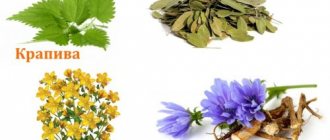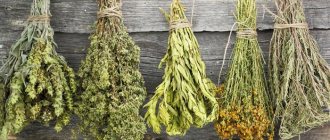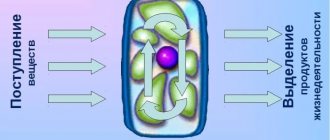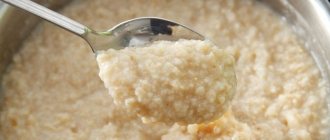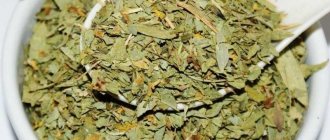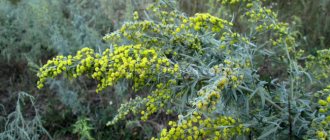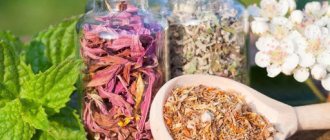Everyone knows that to lose weight it is important to have a good metabolism. Unfortunately, many of the methods by which people are used to fighting excess weight only make it worse. These include strict diets and constant food restrictions. To normalize metabolism, you need to eat properly, fully and balanced. And plants can complement this process. Let's look at what herbs can be used to improve metabolism.
A little history
In past times, in almost every house in Rus' there were bunches of medicinal plants such as chamomile, St. John's wort, thyme and so on. They served instead of a home first aid kit and were used for a number of diseases.
Each plant has a certain effect on the human body: some of them help fight the runny nose and improve immunity, others soothe, and others help normalize metabolic processes and lose weight. If you use metabolic herbs correctly, you can achieve good results.
But medicinal plants should not be used thoughtlessly. You need to know information about how they affect human metabolism, which of them have fat-burning, appetite-reducing, diuretic, and laxative effects.
It is necessary to understand that medicinal herbs do not give immediate results. They accumulate in the body and gradually remove toxic substances, improve blood circulation and speed up metabolic processes.
Mechanism of weight loss
To remove fat folds, people most often resort to three proven methods: dieting, exercising vigorously, or undergoing liposuction. And few people think that there are ways that are much simpler and safer for health than all of these.
Hunger strikes lead to exhaustion of the body. Exercising either leads to dryness of the body or increases muscle mass, which does not contribute to the loss of kilograms. Surgical intervention is always fraught with many consequences and complications.
We suggest, as an alternative, to consider herbs for weight loss that burn fat, on the basis of which you can prepare healthy decoctions and infusions, drink them for a certain time (in courses) and get lasting results.
Here's how ordinary plants can change such complex biochemical processes occurring in the body:
- they contain substances that can destroy fat cells;
- they normalize metabolism, and with it lipolysis - the breakdown of fats into acids and their removal from the body, somatropin and glucagon take an active part in this, the production of which is promoted by plant extracts;
- they slow down the production of inulin, which inhibits the process of lipolysis;
- have a thermogenic effect, i.e. they contribute to an increase in body temperature, as a result of which fats are burned faster.
As a result, you can get excellent results that no diet can produce:
- weight loss up to 10 kg per month;
- the kilograms that go away will not return, since the process of lipolysis will be established and will not allow the body to begin storing fat in reserve again (however, for this it is advisable to normalize nutrition);
- correction of the figure in the most problematic areas (such herbal medicine will remove visceral fat on the abdomen, folds on the sides, waist, hips, buttocks, arms);
- The rejuvenating and regenerating effect of most medicinal plants will guarantee that after losing weight there will be no stretch marks or cellulite left on the body.
And most importantly, fat-burning herbs will simultaneously produce a therapeutic effect if there are any health problems. Diets and intense training are prohibited for many due to the presence of contraindications. But if you choose the right medicinal plant for your illness, then the prohibitions can be avoided.
This is interesting. When you exercise or go on a diet, the body begins to look within itself for energy reserves. It first uses adenosine triphosphate (ATP), which is stored in the muscles. As soon as it ends, carbohydrates are consumed - glucose is taken from the blood and glycogen from the liver. And only when these storage facilities are emptied (and this will take a lot of time) will the subcutaneous fat cells finally begin to be used up. Therefore, fasting and training for quick weight loss are not an option. But herbs allow you to achieve the desired result immediately.
Herbs that speed up metabolism for weight loss
Let's look at which herbs are useful for speeding up metabolism:
- Nettle helps increase the speed of metabolic processes. It contains a large amount of vitamin C and chlorophyll grains. To speed up metabolism, you can use nettle decoctions and infusions; you can also add it to salads and first courses.
- St. John's wort also has the property of accelerating metabolism. But you need to keep in mind that it is capable of removing from the body all the medicinal components that you take, so if you take certain pills, it is better not to use this plant.
- Lingonberry leaves are used to normalize metabolism and lose weight. They also help saturate the body with vitamins, which is important for proper and healthy weight loss.
- Chicory is also used to restore metabolic processes, and it is not only healthy, but also quite tasty.
Rating of the most effective herbs for slimness
Traditional medicine offers its own list of the best herbs for weight loss. It includes the following plants:
- ginger;
- Altai grass senna;
- hellebore;
- white mistletoe;
- dandelion;
- sencha tea leaves or other green tea;
- plantain;
- Zimoluk;
- mess;
- monastery collection.
Let's take a closer look at each plant.
Altai senna grass
As already mentioned, this plant belongs to the category of laxatives. This effect is due to the anthraglycosides included in the composition, which are often included in drugs for the treatment of chronic constipation.
To prepare the infusion, you need to mix a tablespoon of the dry mixture and half a liter of hot water. The Altai herb senna is also available in tablet form to treat constipation and enhance peristalsis.
The Altai herb senna has a strong laxative effect. Taking it without the permission of a specialist is strictly prohibited.
Hellebore
Hellebore belongs to a number of perennial plants of the Ranunculaceae family. It is often found in the vastness of Dagestan and the Caucasus. It is there that it is collected, dried and sent to Russian shelves.
In folk medicine, hellebore is regarded as a natural fat burner. It is believed that this plant helps accelerate metabolic processes and the breakdown of lipids. The maximum daily amount for brewing is a quarter of a teaspoon per glass of hot water (300 ml).
After consuming hellebore infusion, it is not recommended to eat for 1.5-2 hours.
Bardakosh
In folk medicine, this plant is known under another name - marjoram. Chefs around the world value this herb for its subtle, delicate aroma and unique flavor notes.
Bardakosh can be added to salads and dishes or a pinch to tea or herbal infusion. The main thing is to strictly follow the norm specified in the recipe.
mistletoe
Mistletoe is a semi-parasite plant that settles on tall trees and lives off of them. It contains a fairly large amount of useful substances and can be added to tea in small quantities - one or two pinches are enough.
At the same time, white mistletoe also has disadvantages: it contains a high concentration of natural poisons that can cause serious poisoning and intoxication in case of overdose.
Plantain
Plantain contains enzymes, phytoncides, tannins and vitamins of various groups, which can be beneficial to the body when taken correctly. At the same time, this plant has a powerful laxative effect and can cause serious disturbances in the gastrointestinal tract.
That is why it is not recommended to use plantain leaves without consulting a specialist, especially if you have gastrointestinal diseases.
Dandelion
Dandelion contains a high concentration of vitamins C and B. These components have a beneficial effect on the functioning of the body, improve the functioning of the heart, kidneys and liver.
Dandelion leaves can be added to vegetable salads. They are often used in a variety of vegan and vegetarian dishes.
Ginger
Ginger is one of the most common spices in India. It is used to prepare various main courses, salads and snacks, and is also added to tea. It is believed that regular consumption helps normalize the gastrointestinal tract and reduce cholesterol levels.
Since ginger is quite spicy, it is not recommended to use it in its pure form. This may cause irritation in the mouth and larynx. It can be added a pinch to tea or as a powder in main courses, as a spice.
In addition, ginger essential oil is often included in masks and wraps that enhance local blood circulation and improve skin condition.
Green tea leaves
The benefits of green tea are now being talked about everywhere. Its main advantage is its high content of antioxidants, which help slow down the aging process, as well as beneficial microelements.
Green tea is brewed as follows:
- The teapot is preheated by pouring boiling water over the bottom and walls.
- Pour one or two tablespoons of loose leaf tea into the bottom.
- Pour in hot but not boiling water - about 80°C.
- Leave for 3-4 minutes.
Tea needs to be brewed once or twice. Drinking yesterday's drink is strictly prohibited.
Common winterweed
This plant contains a fairly large amount of organic acids and sterols, which are involved in many processes occurring in the body. In addition, wintergreen has a strong diuretic effect, so you can take decoctions based on it only with the permission of a specialist.
You should also know that this plant has a significant drawback. Regular use can lead to severe dehydration of the body, leaching of potassium - an essential substance for the functioning of the cardiovascular system.
Monastic fee
The monastic collection is presented as a means to cleanse the body of waste, toxins and feces. It has a powerful laxative and diuretic effect. This set includes the following plants:
- fennel;
- linden leaves;
- elder;
- chamomile;
- dandelion;
- Altai senna grass;
- peppermint.
Doctors warn that exceeding the maximum permissible concentration can lead to serious problems in the gastrointestinal tract.
Herbs with laxative effects
There are herbs to improve metabolism, which are aimed at a laxative effect, normalizing the digestive tract and cleansing the body. There are quite a lot of them, and here is just a list of some:
- aloe;
- hay;
- kelp;
- horse sorrel;
- dill;
- buckthorn;
- zhoster;
- field steelhead.
Each of them affects the body in a certain way. For example, dill, cumin and centaury have a carminative effect and help eliminate gases accumulated in the intestines. Yarrow has a choleretic effect, which helps cleanse the body.
Senna is often used for weight loss. It is used to prepare a decoction: a tablespoon is poured into a glass of water and boiled for five minutes. This decoction should be drunk after dinner. It usually does not cause side effects, but it is recommended to use it no longer than ten days. At the same time, it is important to monitor the body’s reaction: if the stomach does not accept the decoction well, it is better to drink it every other day. You can also combine senna with other medicinal plants, such as parsley and dandelion.
Diuretic herbs
Herbs to speed up metabolism also include diuretic plants. It is important not to get carried away with them, since minerals and valuable substances can be washed out of the body along with urine. But the correct use of decoctions and tinctures with a diuretic effect makes it possible to remove excess fluid from the body, which will help normalize weight and relieve swelling.
But you need to take into account that diuretic plants do not give long-lasting results. As soon as you stop drinking them, the liquid will begin to accumulate again. If you take such plants, use foods such as bananas, buckwheat, raisins, walnuts and others in your diet, which will help maintain the balance of calcium and potassium in the body.
Here are some plants that have a diuretic effect:
- mint;
- Linden;
- St. John's wort;
- corn silk;
- coltsfoot;
- parsley;
- ear;
- lingonberry and birch leaves;
- knotweed;
- nettle;
- calendula;
- thyme.
Before taking diuretic herbs, you need to consult a specialist, as they have contraindications and side effects.
Contraindications
And yet, despite all their benefits for the body, fat-burning herbs must be used carefully. They contain a huge amount of active substances, which in high concentrations and with regular use can be harmful. To prevent this, it is advisable not to choose this method for weight loss if there are certain contraindications, which include:
- individual intolerance;
- life-threatening conditions requiring urgent medical attention;
- oncology;
- mental and venereal pathologies;
- septic and infectious diseases;
- diseases in the acute stage: bronchial asthma, hypertensive crisis, status asthmaticus, myocardial infarction, etc.;
- pregnancy;
- lactation;
- pancreatitis, ulcer (for these, weight loss is not recommended at all).
If, despite the presence of a contraindication, you still start drinking herbs that promote fat burning, this may result in unpleasant side effects:
- allergic reaction (manifested in nasal congestion, constant sneezing, coughing, skin rash);
- intestinal disorders (diarrhea, nausea, pain and discomfort in the stomach, flatulence, bloating);
- exacerbation of existing diseases;
- lethargy, decreased performance, drowsiness;
- psychotropic consequences: irritability, sudden changes in mood, tearfulness, depressive states.
To avoid such complications, be sure to consider your health status and do not risk it. If you are not sure whether or not you can consume herbs that burn fat and promote weight loss in such an intensive mode (you will have to drink decoctions a lot and often), it is better to consult with specialists in your illness or a herbalist.
Do not forget! Medicinal plants have their own special contraindications, unique to them. So, when choosing this or that herbal medicine, be sure to find out in what cases it cannot be used for health reasons. For example, nettle is not used for poor blood clotting, plantain - for gastritis, etc.
Fat burning herbs
Plants that accelerate fat burning are conventionally divided into two groups - those that directly promote fat burning, and herbs that improve metabolism and promote weight loss through this.
Simple plantain burns fat perfectly. Its leaves contain special components that both improve fat burning processes and minimize the negative consequences of eating fatty foods. To prepare a healthy decoction, you can use not only the leaves of the plant, but also its seeds. Green tea is also an excellent fat burner.
Fat burning is best influenced by herbs that increase body temperature and increase the release of adrenaline. These include the following:
- dandelion;
- turmeric;
- ginger;
- sagebrush;
- flax seed;
- cinnamon;
- yarrow;
- rosemary;
- milk thistle;
- cumin and so on.
Of course, to achieve the best results, it is important to combine herbs for metabolism and weight loss with proper nutrition and physical activity.
Herbs to reduce appetite
Decreasing appetite helps reduce the number of portions and reduce stomach volume, which, of course, promotes weight loss. Also, such plants have a beneficial effect on the functioning of the digestive tract, remove waste and toxins from the body, normalize the intestinal microflora, and help speed up metabolic processes.
Also, some of these plants create a feeling of fullness due to the fact that they envelop the walls of the stomach or, once there, increase in volume and contribute to the feeling of fullness. At the same time, they contain extremely few calories, and the body draws energy from fat reserves.
Pharmacies sell ready-made herbal mixtures to reduce appetite. You can also prepare them yourself or use the plants separately. The following herbs can be used for this:
- winterweed;
- chicory;
- hellebore (find out how to take it correctly for weight loss here);
- marshmallow root;
- senna;
- flax seeds;
- dandelion;
- burdock;
- kelp;
- corn silk.
Herbs for weight loss: description and properties
Herbs for weight loss are plants familiar to many, used for decoctions, infusions, and teas. They are widespread throughout Russia, found in fields and meadows. You can purchase them without problems in pharmacies, markets or natural food stores. For example, “Collection No. 22 for weight loss” is very popular now.
Herbs contain:
- micro- and macroelements;
- vitamins;
- water;
- glucose and complex carbohydrates;
- fiber.
The beneficial properties of herbs are widely used in folk medicine. But, as a rule, not for weight loss, but for treating or relieving symptoms of various diseases. They are especially often used for sore throats, respiratory tract diseases, and skin rashes. Traditional healers recommend using herbs in the form of infusions, teas or decoctions. The order of use is different for each individual plant.
Herbs that accelerate metabolism in the body: several recipes
Herbs that improve metabolism must be used correctly. You can prepare decoctions and infusions, or herbal teas. Here are a few recipes that will help normalize your metabolism:
- Finely chop ginger root and mix it with lemon, brew with boiling water and drink whenever you feel uncontrollable hunger. After drinking the drink, you will feel a pleasant warmth spreading throughout your body. This will mean that fat burning processes have started in the body. If you don't like the taste of the drink, you can add a little honey.
- Ginseng is useful, especially in autumn and winter, when the body lacks its own resources. You need to grind the dried root of the plant into powder and pour boiling water in a ratio of 1:10. Let it sit for ten minutes, then strain and drink. It is recommended to have such tea parties in the first half of the day, since ginseng acts like an energy drink and, when consumed at night, can cause problems with sleep. The course lasts 30 days.
- Mix fennel fruits, chamomile, elderberry and linden flowers, add dry peppermint leaves (all a tablespoon). Brew the mixture with boiling water and let it brew, preferably under a lid or in a thermos. You can dilute the infusion with water and drink it like tea.
- Chamomile, linden and St. John's wort need to be mixed and poured with boiling water. It is recommended to use the infusion after meals.
- There is also a recipe based on parsley. You need to chop and mix violet, nettle, birch leaves and curly parsley root. Pour boiling water over the composition and let it brew. It is recommended to drink the infusion three times a day, half a glass.
- Nettle and mountain ash perfectly stimulate metabolic processes. They need to be mixed in a combination of 3:7, pour boiling water (500 ml of water per tablespoon), boil for ten minutes, and then leave to infuse for three hours. Use the decoction warm.
- You can prepare vitamin tea by mixing oregano flowers and leaves of berry bushes (blackberries, lingonberries, black currants). Let it brew in a ceramic bowl.
Dandelion
All parts of dandelion have a medicinal effect and help normalize metabolism in the body due to the high content of calcium and a whole group of trace elements and vitamins (manganese, iron, phosphorus, boron, vitamins A-C-B-E-PP).
Dandelion juice:
- stimulates digestion;
- restores acid-base balance;
- improves appetite;
- increases hemoglobin;
- calms the nerves, which is valuable when following a diet to start metabolism.
Contraindications:
- serious stomach or intestinal problems;
- hypotonic disturbances in the functioning of the gallbladder;
- plant allergy.
In summer, it is recommended to consume the leaves by adding them to salads and seasoning with low-fat kefir or vegetable oil. To lose weight and normalize metabolism, you can buy a phytonutrient supplement (for example, “Dandelion-P”), and also drink tea from the leaves and roots. They are sold at pharmacies or prepared independently.
On a note! Find out how you can speed up your metabolism using various methods.
Dandelion decoction recipe
Wash the leaves and root thoroughly (or take a ready-made collection). Chop them and brew a tablespoon with a glass of boiling water. Leave for an hour, strain. Drink a third of a glass three times a day before meals. To prevent the drink from being too bitter, add honey to it.
Herbs that accelerate metabolism: contraindications
In general, plants that speed up metabolism have a positive effect on the body. Adaptogen plants can be used over a long period because they work in a complex manner. They help improve the processing of fat deposits into energy. However, it is important to control nutrition and give the body the opportunity to burn excess energy through sports. If you eat poorly and lie on the couch, plants alone will not help you.
If you want to “spot” speed up your metabolism, you need to use teas and decoctions carefully, in courses. Many herbs that speed up the flow of urine may be contraindicated if you have kidney problems. And the popular herb senna, if consumed for a long time, can cause swelling.
In addition, you need to take into account that any plant can provoke an allergic reaction. Before taking any herbs, you should consult with your doctor, since you need to determine the speed of metabolic processes and understand whether they need to be improved.
Knowing which herbs speed up metabolism in women and others, you can help yourself achieve better results in losing weight. But be aware of possible side effects and use plants carefully.
Horsetail
One of the effective plants that improves metabolism is horsetail. This wild herb has long been used in folk medicine to treat intestinal disorders, liver and stomach problems, but due to the fact that it is poisonous, it should be used with extreme caution when used at home. Only young spring shoots can be eaten, after soaking them in water for 24 hours.
Having a strong diuretic and hemostatic effect, horsetail is ideal for weight loss. He:
- reduces appetite;
- normalizes water-salt balance;
- has a general strengthening effect;
- speeds up metabolism;
- removes waste and toxins.
Contraindications:
- individual intolerance;
- severe kidney pathologies;
- pregnancy and breastfeeding.
To lose weight and start metabolism, it is recommended to drink horsetail decoction every day for a month. To avoid poisoning, it is better to buy a ready-made extract at a pharmacy and use it to prepare a decoction. Drink any drink based on horsetail 2-3 sips a day - no more!
Horsetail decoction recipes
- If you collect horsetail yourself, soak it in water for a day. Then finely chop the stems, pour 2 tablespoons of the raw material with water and boil. Simmer over low heat for 30-40 minutes. Leave until completely cool, pour into a jar and close the lid tightly. Freshly prepared broth is stored in the refrigerator for no more than 2 days.
- If you buy the extract, then pour 5 tablespoons into 250 ml of boiling water and mix thoroughly. It is better to prepare a new portion each time, since the shelf life of the extract drink in the refrigerator is also only 2 days.
- In a pharmacy or herbal shop you can also buy horsetail in tablets, capsules or packaged for making tea.
Important! Each person's metabolic rate is individual, so it is important to know your daily calorie intake.
